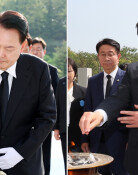First trial after the enactment of Kim Young-ran Act
First trial after the enactment of Kim Young-ran Act
Posted October. 20, 2016 07:23,
Updated October. 20, 2016 07:30
I remember my daughter's teacher who exactly resembled Ximena, the teacher who starred in the children's telenovela "Carousel," when my family stayed in the U.S. in 2010. She used to leave long comments - long enough to cover the blank space under my daughter's English diary. As a sign of gratitude for her considerate care, my wife and I gave her a 20-dollar coffee card at the parent-teacher meeting. We were worried whether she would reject our gift, but our Ximena received the card with a delightful smile. In fact, it was literally a gift.
In its special report titled "The etiquette of briber," the British weekly Economist analyzed that there were many terminologies for bribery, which were frequently given inside brown envelopes in corrupt nations. However, if it's purely intended to be presented as a gift, one may not feel the necessity to call it with another name, nor should it be concealed. But Koreans still give and take the so-called "sweetener" or an "express charge" contained inside an envelope or a beverage box so that the total amount is not exposed. Indeed, it is a shame that Korea was ranked 9th in the Organisation for Economic Co-operation and Development (OECD)'s Corruption Perceptions Index, but numbers never lie.
The Chuncheon Police Station requested that the court levy a fine on the possible violation of the "Improper Solicitation and Graft Act" (or also known as Kim Young-ran Act), on charges that the 55-year-old plaintiff sent a box of rice cake worth 45,000 won to a detective last Sunday. This comes as the first case put on trial after the enactment of the Act on Sept. 28. The police must have contemplated over the illegality of the issue, as it took 20 days to report the case after receiving the rice cake. It was known that the plaintiff expressed gratitude to the detective for rescheduling the investigation time due to personal matters. Still, the investigation period can be rescheduled whenever the plaintiff wants to. Thanking for what is should be taken for granted clearly shows that public offices are still lofty, making citizens difficult to get simple things done.
The recent case led to divided opinions between opponents who argue that "it's too much to put a petty case on trial," and supporters who see that "even the smallest violation should be punished." Ironically, the first subject of judgment under the Kim Young-ran Act became a post-investigation gift box filled with rice cakes, not a lump-sum of sweetener. Past cases show that when both the giving and receiving end of bribery conspire, they often led to clandestine and organized crimes. If the judicial branch only focuses on prosecuting minor violations, which can also be interpreted as "good-willed small gifts," the Act is doomed to lose this war against corruption.







